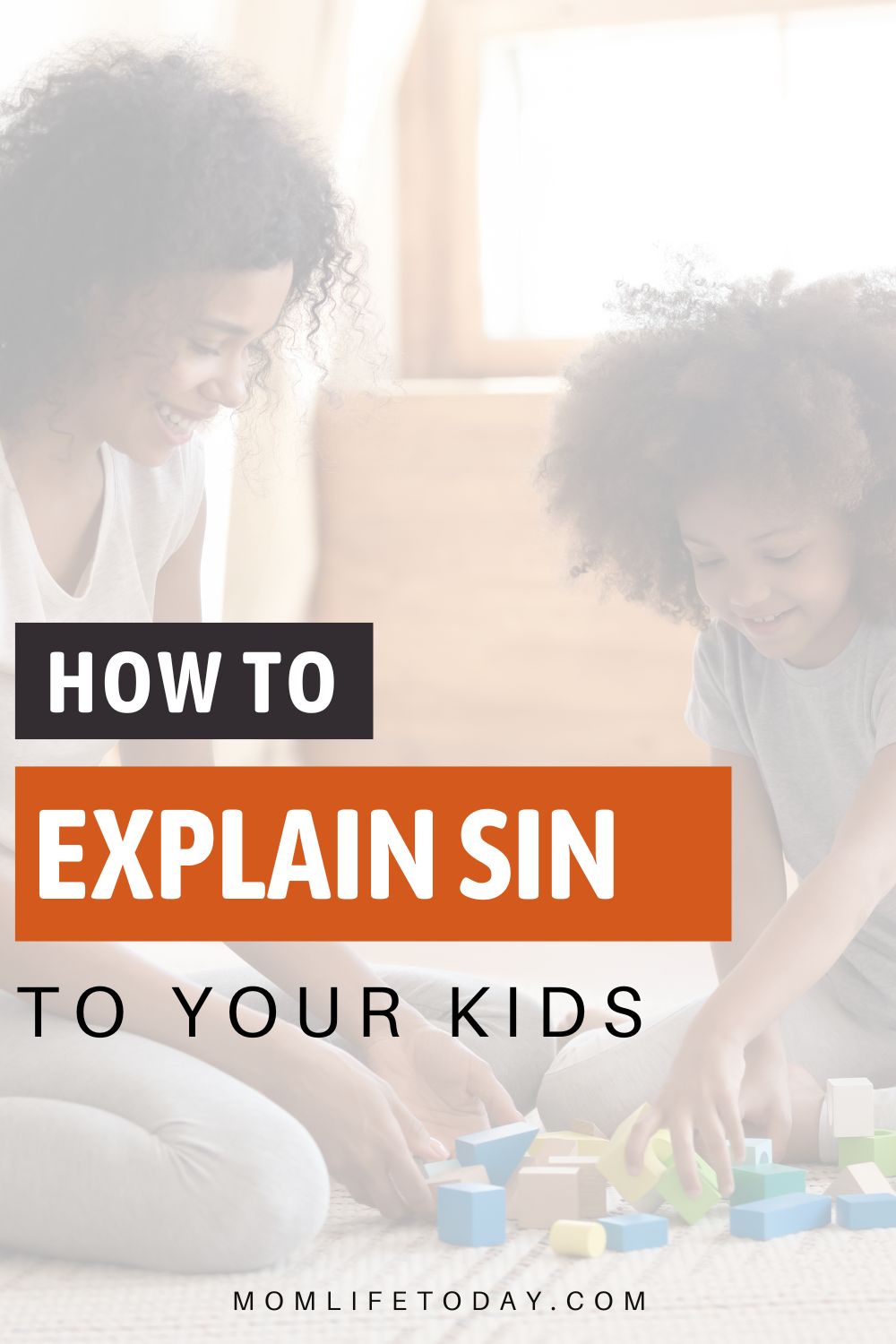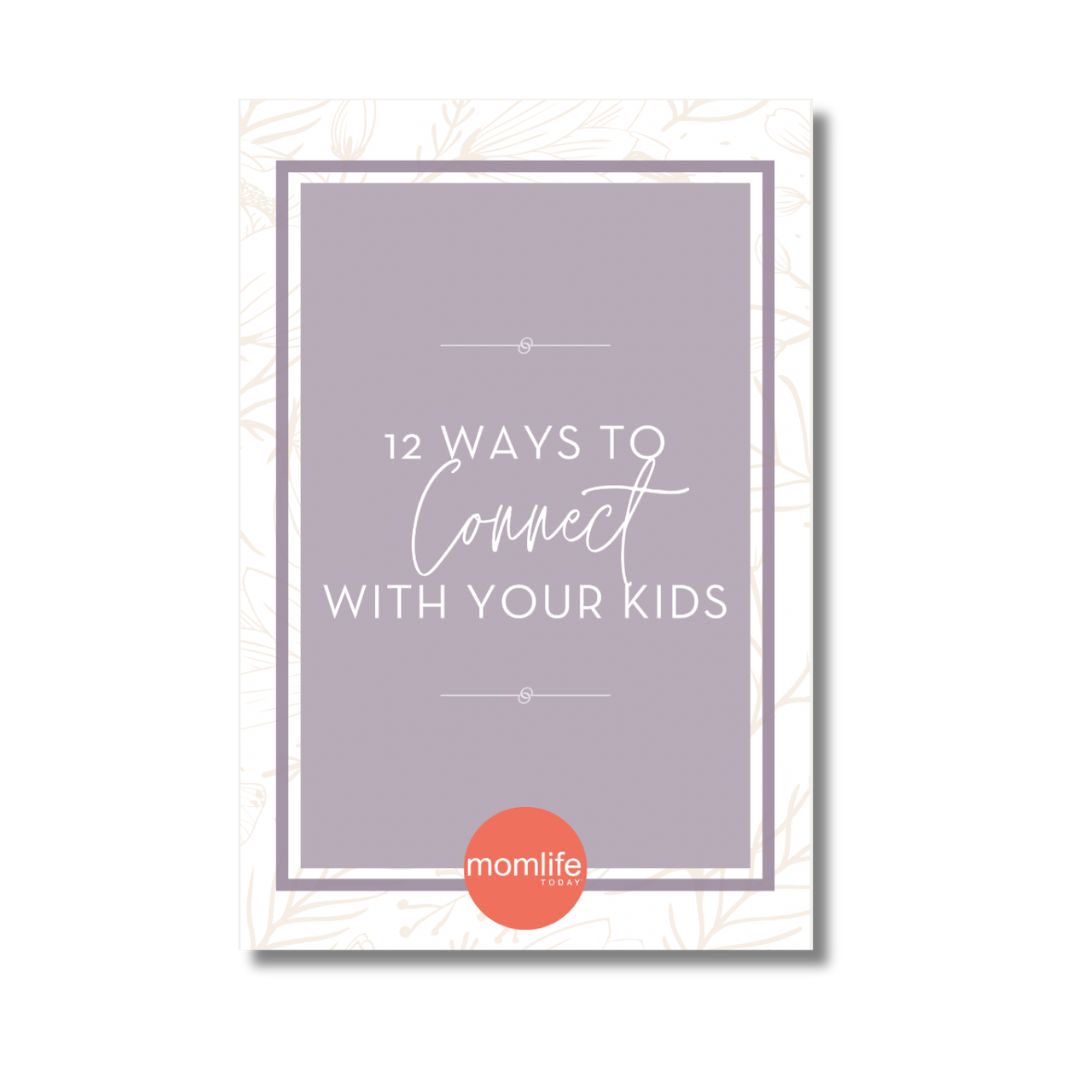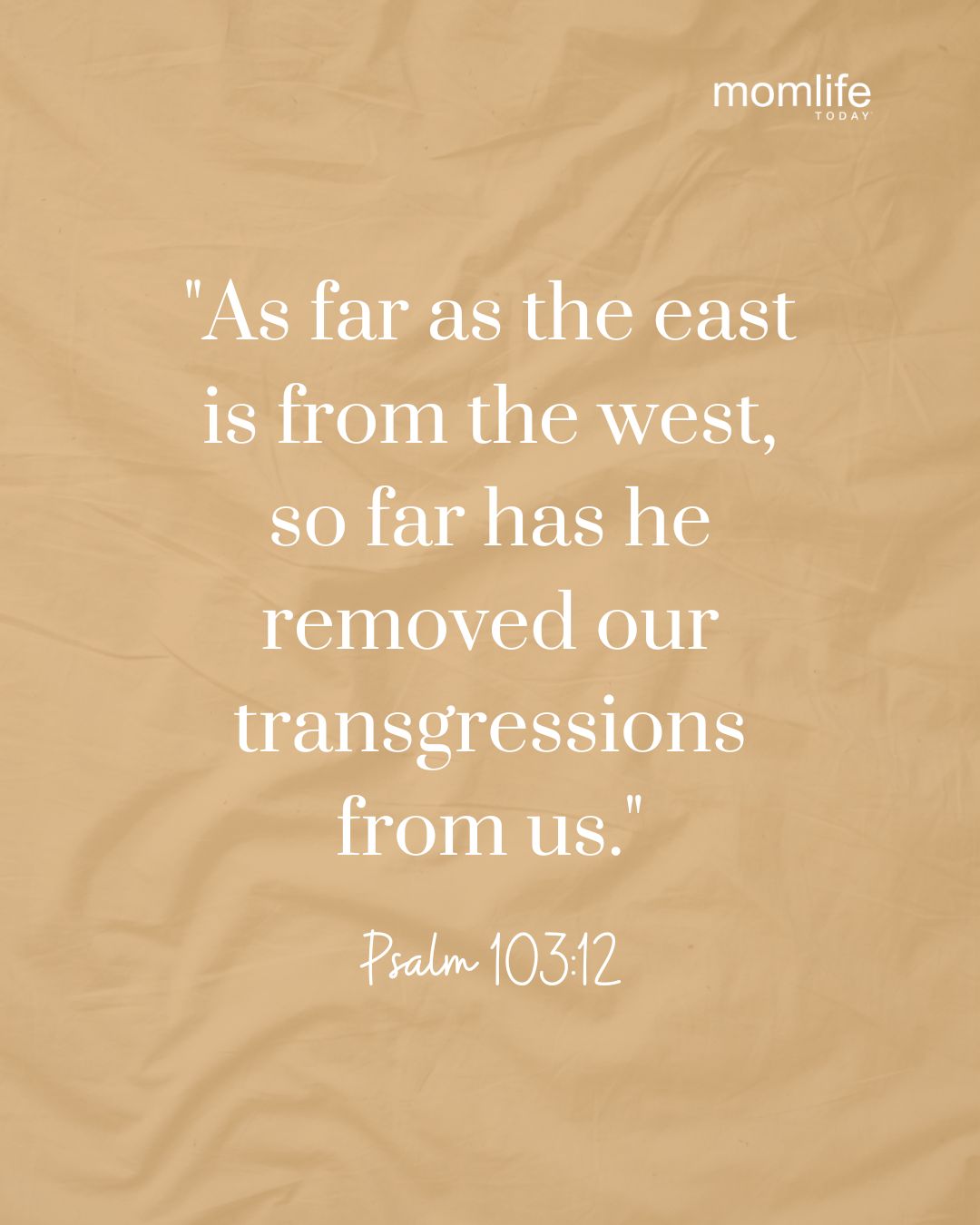
“Mommy, what is sin? Do I do it?”
The minute my son asked the question, I instantly realized it was a conversation we were probably past-due to have.
Since my son was born, he had been in church every Sunday learning about Jesus and the Bible. We prayed before every meal and thanked God for our day before bed.
But faith in God isn’t all sunshine and flowers, although God loves us no matter what we do or what we’ve done.
I certainly didn’t feel prepared, but I knew it was time to help give my 5-year-old son a better understanding of sin.
What are the Roots of Sin?
The first thing I did was pray, and then start to talk to some of my other mom friends about talking about sin and our need for salvation with their kids.
One tip I found super helpful was being able to tie all the Bible stories and holidays that we regularly talk about (The Garden of Eden, Noah’s Ark, Christmas, Easter) to the bigger picture of God’s story.
We shared with my son that the roots of sin began long before we were ever born.
1. God created the world and everything in it. Adam and Eve were the first man and women, both created in God’s image to bring Him glory and to walk with God everyday.
2. Everything in the Garden was God’s standard of perfection. Everything He created was for them to enjoy, except for one thing – the Tree of the Knowledge of Good and Evil.
The Bible says that Adam and Eve lived in the Garden and had “Nothing to be ashamed of.” (Genesis 2:25).
3. But when Eve interacted with a serpent who was most likely inhabited by Satan, she was tempted away from God’s original plan for mankind. This temptation marks the original sin.
In the Bible, Satan is called, “A liar and the Father of Lies.” (John 8:44). The beginning of the roots of sin for all humanity started there in the Garden, when Adam and Eve believed Satan’s lies about ultimate knowledge over God’s truth.
Where Did Sin Come From?
When Adam and Eve disobeyed God and ate from the tree, sin entered the Garden, and their hearts, for the first time.
After disobeying God, they were ashamed and downcast. The Lord punished man, woman and the serpent and their descendants forever, and they were driven out of the Garden. (Genesis 3:23-24)
Because we’re all from the line of Adam and Eve, we are born with a sinful nature in us, too. The Bible tells us that the consequences of sin is death!
While people all throughout the Bible had to regularly give sacrifices and atone for their sins, God stepped in and gave the ultimate gift – His Son, Christ Jesus.
Through Jesus dying on the cross, He took on every sin that we ever have had or will have and paid the price of our sin for us!
You can read more about this in our post How to Explain the Meaning of Easter to Your Child.
For a little bit older kids, the Bible Project has a really great video that explains the concept of sin a little deeper.
A Timeline of Sin
Another great way to lay out the story of sin for your kids is to talk about in a timeline, and show them where THEY are in the story!
You can read excerpts from each of the Bible stories over the course of a week or a month together or even create your own timeline with some poster board.
This is a great activity to do around Christmas, Easter, or really anytime of year.
Here’s a general timeline of sin in the Bible, highlighting the key events and figures related to sin from Genesis to the New Testament:
1. The Fall of Man (Genesis 3)
- What Happened: Adam and Eve disobey God’s command by eating from the Tree of the Knowledge of Good and Evil.
- Consequence: Sin enters the world, bringing death and separation from God.
2. Cain and Abel (Genesis 4)
- What Happened: Cain (Adam & Eve’s son) becomes jealous of his brother Abel and murders him.
- Consequence: Cain is cursed and becomes a wanderer on the earth.
3. The Wickedness of Humanity (Genesis 6)
- What Happened: Humanity becomes increasingly wicked and corrupt.
- Consequence: God decides to send a flood to destroy all life, sparing only Noah and his family.
4. The Tower of Babel (Genesis 11)
- What Happened: People attempt to build a tower to reach the heavens, defying God’s command to spread out and fill the earth.
- Consequence: God confuses their language and scatters them across the earth.
5. Sodom and Gomorrah (Genesis 19)
- What Happened: The cities of Sodom and Gomorrah are filled with sin and depravity.
- Consequence: God destroys the cities with fire and brimstone, sparing only Lot and his daughters.
6. The Golden Calf (Exodus 32)
- What Happened: While Moses is on Mount Sinai getting the Ten Commandments, the Israelites create and worship a golden calf.
- Consequence: Moses breaks the tablets of the Law, and many Israelites are punished.
7. The Period of the Judges (Judges)
- What Happened: Israel repeatedly turns away from God, worshiping idols and engaging in sinful behavior.
- Consequence: God allows His people to be oppressed by neighboring nations until they repent and cry out for deliverance.
8. The Divided Kingdom (1 Kings 12)
- What Happened: After Kind David and Solomon’s reign, Israel splits into the northern kingdom of Israel and the southern kingdom of Judah. They both fall into idolatry and sin.
- Consequence: Both kingdoms are eventually conquered and exiled (Israel by Assyria and Judah by Babylon).
9. The Prophets’ Warnings
- What Happened: Prophets like Isaiah, Jeremiah, and Ezekiel warn Israel and Judah of their sins and call them to repent.
- Consequence: Despite warnings, the people largely ignore the prophets, leading to destruction and exile.
10. The Coming of Jesus (New Testament)
- What Happened: Jesus Christ, the Son of God, comes to earth, lives a sinless life, and teaches about the Kingdom of God.
- Consequence: Jesus’ sacrificial death on the cross and resurrection provide the means for forgiveness of sin and reconciliation with God.
11. The Early Church (Acts and Epistles)
- What Happened: The apostles and early Christians spread the message of Jesus, but also address sin within the church.
- Consequence: Teachings and letters from apostles like Paul, Peter, and John guide believers in living holy lives and dealing with sin in the community.
12. The Final Judgment (Revelation)
- What Will Happen: In the vision given to John, Jesus returns to judge the living and the dead.
- Consequence: Sin and death are ultimately defeated, and those who are faithful to God are rewarded with eternal life.
This timeline, adapted for the age of your kids, can help you capture their imagination and cover the overarching narrative of sin and redemption all throughout the stories of the Bible.
12 Important Bible Words for Kids
Finally, as you explain sin to a child, it’s important to be able to break down the terminology that we use to talk about sin and salvation with our kids.
Besides explaining the meaning of sin, here is a more extensive glossary of Bible terms and explanations that may be helpful to have in your back pocket for young children.
1. Sin – Sin is as any thought, word, or action that goes against God’s rules and His will. A sin is something that separates humans from God, and it includes things we do on purpose and when fail to live by God’s standards.
2. Sinful nature – Our sinful nature is our tendency desire in us to sin. It’s something in us being drawn toward disobedience and acting against God’s will and nature.
3. Devil/Satan– The devil or Satan is a fallen angel who opposes God and tries to lead people away from Him.
4. Salvation – Salvation is a free gift of God. It’s being saved from sin and its consequences, and being given eternal life with God through faith in Jesus.
5. Sanctification – Sanctification is the process over time of becoming more like Jesus and growing in holiness through the work of the Holy Spirit.
6. Repentance – Repentance is feeling sorry for your sins, turning away from them, and turning back to God.
7. Holy Spirit – The Holy Spirit is God’s Spirit who lives in believers, guiding, comforting, and helping them to live according to God’s will.
8. God’s Forgiveness – God’s forgiveness is when God pardons our sins and removes the guilt, allowing us to have a restored relationship with Him.
9. Sacrifice – Sacrifice is giving up something valuable for God, especially referring to Jesus giving His life to save humanity from sin.
10. Crucifixion – When Jesus died on a cross and paid the penalty for all of our sins past, present and future .
11. Righteousness – Righteousness is being right with God and living in a way that pleases Him.
12. Baptism – baptism is a ritual of washing with water that symbolizes a person’s faith in Jesus, cleansing from sin, and entry into the Christian community.
7 Bible Verses About Sin and Forgiveness
As you continue talking about sin, salvation and life with God, here are some great Bible verses about sin and forgiveness to share with your kids.
You can always choose a few and over the course of a few weeks or a summer, work on memorizing them all together!
1. “For the wages of sin is death, but the gift of God is eternal life in Christ Jesus our Lord.” – Romans 6:23
2. “For all have sinned and fall short of the glory of God, and all are justified freely by his grace through the redemption that came by Christ Jesus.” – Romans 3:23-24
3. “If we confess our sins, he is faithful and just and will forgive us our sins and purify us from all unrighteousness.” – 1 John 1:9
4. “In him we have redemption through his blood, the forgiveness of sins, in accordance with the riches of God’s grace.” – Ephesians 1:7
5. “As far as the east is from the west, so far has he removed our transgressions from us.” – Psalm 103:12
6. “Come now, let us settle the matter,” says the Lord. “Though your sins are like scarlet, they shall be as white as snow; though they are red as crimson, they shall be like wool.” – Isaiah 1:18
7. “Repent, then, and turn to God, so that your sins may be wiped out, that times of refreshing may come from the Lord.” – Acts 3:19
8. “For he has rescued us from the dominion of darkness and brought us into the kingdom of the Son he loves, in whom we have redemption, the forgiveness of sins.” – Colossians 1:13-14
We’re all imperfect people who are in need of a Savior. These scriptures from the Word of God reminds us of the seriousness of sin and the nature of sin.
But they also highlight that when we come before a Holy God, He can wash away all of our sin through the power of God and set us on the right path again.
Conclusion
If you’re looking for other ways to explain sin to a child, you can always compare it to making mistakes or breaking rules. Emphasize that sin means choosing to do something wrong instead of what is right, which can hurt our relationship with God and others.
Use relatable examples of bad things they might do, like breaking a toy or being unkind, to illustrate how sin affects us.
Then, reassure your child that God’s love is for ALL of us, and He offers forgiveness to help us make better choices and grow closer to Him.
Talking about sin, repentance and salvation with our kids is actually an exciting opportunity that we have to share with them what the good news of the Gospel is all about!
Try not to be scared of these conversations. If there’s anything I’ve learned, it’s that they can actually turn out to be some of your favorite memories.
Have you had the conversation about sin yet with your kids? What other tips would you add on how to explain sin to a child?
*This post was originally published July 21, 2024



